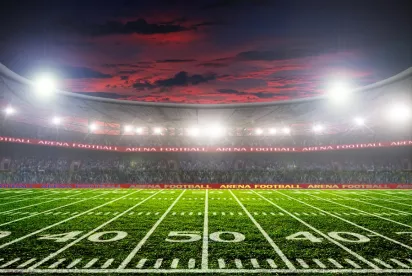Few things are more ubiquitous in sports than informing an official—sometimes politely but, more often than not, rather impolitely—that they made an incorrect call. Officials no doubt anticipate this hostility and tune it out while on the field. What they likely do not anticipate, however, is being haled into a deposition months after the game ended to be questioned under oath about a call made on the field. Yet this is the exact situation currently facing several officials of the American National Football League (NFL).
On January 20, 2019, the New Orleans Saints hosted the Los Angeles Rams in the NFC Championship Game. At stake, a trip to the Super Bowl, one of the most-watched sporting events in the world, to face the New England Patriots. With just under two minutes remaining in the game, and with the teams tied at 20 points apiece, the quarterback for the Saints threw a perfect spiral to an open receiver practically waltzing into the end zone. This game-winning touchdown pass was forcefully interrupted by a Rams defensive player who, having sprinted from mid-field and lowered his shoulder, leveled the Saints receiver before the ball was even remotely close to the receiver’s outstretched hands.
This was a textbook example of “pass interference” in the NFL—a foul that occurs when “a player more than one yard beyond the line of scrimmage significantly hinders an eligible player’s opportunity to catch the ball.”[1] But the official, standing a mere ten feet from the play, did not call a penalty for pass interference. The home crowd roared in anger; had the call been made, the Saints would have likely scored a touchdown on the play, or at the very least been well situated to do so. Instead, the Saints settled for a field goal. The Rams then took possession, quickly marched down the field, and kicked a field goal to tie the game. The Rams went on to win the game in overtime.
Saints fans were furious. In the wake of the loss, a few of the more opportunistic fans filed several lawsuits based on the no-call, including a class action against the NFL, its commissioner Roger Goodell, and the officials themselves. Three such lawsuits ended up in federal court—one was originally filed there, and the NFL successfully removed two others from state court. Each federal case was quickly dismissed by the courts.
A fourth lawsuit, however, is still pending in the Orleans Parish Civil District Court in Louisiana. This lawsuit, filed by four Saints fans, alleges fraud by NFL officials and personnel. Notably, the lawsuit seeks $75,000 in damages, keeping it below the threshold necessary to remove to federal court. In other words, this lawsuit is parked firmly in state court, where judges are elected rather than appointed, and which has already inured to the plaintiffs’ benefit. Despite efforts from NFL’s legal counsel, a Louisiana 4th Circuit Court of Appeals panel upheld the trial court’s decision to allow the lawsuit to proceed.
While the NFL can appeal to the Louisiana Supreme Court, the decision was nonetheless a win for the plaintiffs, who just last week were permitted to conduct discovery in the case. Wasting no time, the plaintiffs have served the NFL with requests for documents and information. In addition, the trial court has permitted the plaintiffs to depose Mr. Goodell and three of the officials from the NFC Championship game, with depositions tentatively scheduled to begin in September. At the heart of these depositions will be the decision not to call pass interference, and whether those officials were disciplined for missing the call.
While the plaintiffs’ likelihood of success on the merits remains to be seen, their efforts to date are nonetheless impactful. Assuming the NFL does not mount a successful appeal, the precedent has been set where NFL personnel, including officials, can be forced to give sworn testimony regarding decisions made on the field.
[1] Official Playing Rules of the National Football League, Rule 8, Section 5, Article 1.




 />i
/>i

